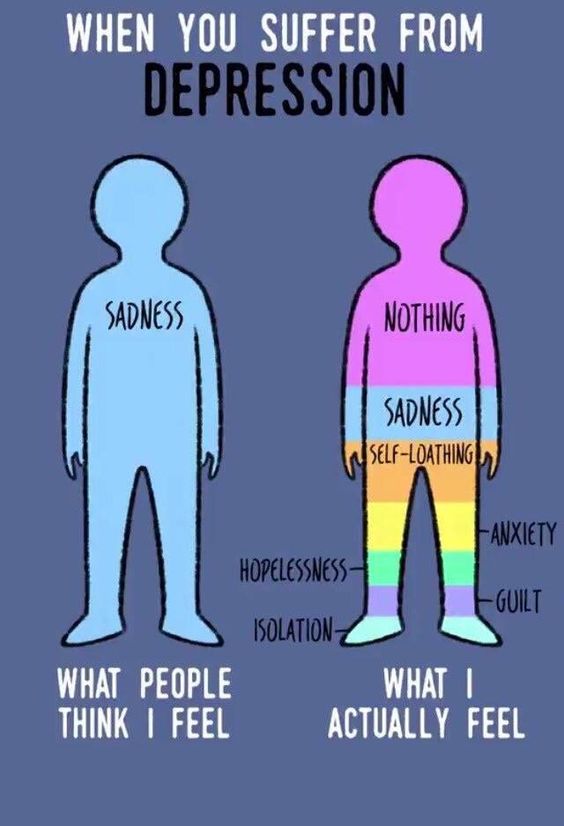Published In
Depression

This is How Depression Looks Like | Keep Checking on Your Loved Ones
Through this cover image, one thing is clear that depression doesn’t have a face. The age-old perception that we have linked with depression is having a sad face, no self-care, unsuccessful life, or a complete state of failure.
But, is that true? Is that what depression is?
Simple Answer, No!
But, because we are hooked to this false perception of depression, we fail to notice real depression cases right around us! Because of this, sometimes we are just too late to even be the helping hand we should have been.
Sigh!
The reason why depression goes unidentifiable is right there- lack of communication and perhaps lack of knowledge. We keep on hushing important mental health topics like depression, anxiety, inflicting self-harm, and many others, as if merely talking about them will put us in that phase! The irony is that while we are constantly avoiding these topics the percentage of the population experiencing them is increasing.
So, why hush it?
Educate yourself about what depression is, what anxiety is, what psychosis is, what mental health really is!


I bet if I ask you what is coronavirus or what is cancer you might present a thesis on the same to me. But, on the contrary, if I ask you what psychosis is or the most popular mental health condition around the world- depression is, a list of misconceptions might be handed over to me.
Which is not only sad but also scary! We are not only avoiding such sensitive yet important topics but also building misconceptions about the same in our heads!
STOP! Please STOP right there. Take three deep breaths
Inhale… Exhale…
Inhale… Exhale…
Inhale… Exhale…
Now, buckle up because we are going to talk about DEPRESSION (and it is going to get real this time and I am going to share my experience with you)
What is Depression?
To make you understand depression, I am dividing my answer into two simple definitions. Depression is a response of our body to lack of the neurotransmitter serotonin in our body among others.
Depression is a deepened sad feeling that has started interfering in the normal functioning of your life.
The Different Types of Depression
Depression is a complex disorder that can be difficult to diagnose. However, according to the National Institute of Mental Health, there are two most common types of depression; Major Depression (or clinical depression) and Persistent Depressive Disorder (or dysthymia)
Major depression is more commonly diagnosed and can be categorized as having symptoms nearly every day for two weeks or more. The symptoms of MDD can interfere with your work, sleep, and life.
Persistent depressive disorder or dysthymia can be diagnosed after you show symptoms that last for two years or more.
Other types of depression can include:
- Perinatal depression: Symptoms of depression occur during pregnancy
- Postpartum depression: Symptoms occur after pregnancy and childbirth
- Seasonal affective disorder (SAD): Symptoms or depressive episodes occur when the seasons change
- Psychotic depression: Co-occurs with one or other symptoms of psychosis
- Premenstrual dysphoric disorder (PDD): Symptoms occur before, during, and after the premenstrual cycle.
What Depression Looks Like? Know The Signs!
If you’re wondering what depression looks like, then look no further! I’ve listed some of the most common signs and symptoms of depression. Please keep in mind that the symptoms of depression can range from mild and moderate to severe.
Symptoms of depression can include:
- Feeling extreme (and persistent) sadness
- Loss of pleasure in once enjoyable activities (anhedonia)
- Feeling hopeless and worthless
- Feeling irritable
- Experiencing difficulty sleeping or concentrating
- Experiencing changes in appetite
- Lack of energy
- Experiencing difficulty remembering things
- Experiencing aches and pains
- Experiencing digestive problems
- Lack of personal hygiene
- Withdrawing from social activities
- Having thoughts of non-suicidal self-harm
- Having thoughts of suicide
For many people struggling with depression, feeling hopeless is one of the most common experiences. They feel like there is no way out of the void they’ve fallen into.
If you are having suicidal thoughts, contact the National Suicide Prevention Lifeline at 1-800-273-8255 for support or contact iCall at +91-9152987821. If you or a loved one are in immediate danger, call your nearest emergency services.
What are the Causes of Depression?
There is no one cause of depression. It is an outcome of both nature (your genes) and nurture (your environment). Here are certain points to be aware of:
- Depression is not found to be linked to a particular age, gender, race, or creed.
- Depression is not found to be linked to socioeconomic status.
- Depression is not a choice made by an individual.
Note: It is important to note here that there are no particular signs of a person showing depression (just like there is no particular cause of it). However, withdrawal from pleasurable activities and people is a major sign that you should keep a check of.
How to Safeguard Yourself From Depression?
By now one thing is clear: an individual doesn’t choose depression (just like you don’t choose to get cold and cough, but you end up catching it).
You can safeguard yourself from depression by keeping the following pointers in mind:
- Be aware of your feelings, thoughts, and behaviors!
- Find a hook in your life.
- Don’t shy off before seeking professional help. It is your mental health and it is important!
- Reach out to a friend and it will help you release off a lot of mental loads.
- Be regular with your medication. It helps you regain your lost chemical imbalance.
- Bring healthy lifestyle changes. They are an important aid to fight depression
Find a complete self-help guide on depression.
How to be There for Someone Who Might be battling Through Depression?
It might not be easy for a friend of yours to open up about depression but you can definitely help them. You really can’t be waiting for someone to leave your side before you realize that you can be a lifeguard in someone’s life. So, it is better to be there before it’s too late…
1. Be Mindful:
Is a friend of yours recently avoiding to meet you at the club he never said a no to? Or is he keeping himself in a shell from the past few days? Take these little signs as alarming signs and don’t ignore them.
2. Be a Checker:
We are glued to our phones. Just take one minute out and text 2 friends of yours asking them how they are doing in their life or just catch up with them. It will help them come out of the phase that I have no one for me or
3. Be There:
Many people comment that saying “I am there for you” won’t help but trust me reassurance does leave an impact (even if it is little). So, never miss a chance to tell your friend “I am here mate.”
4. Be Kind:
Most importantly if you can’t be there for someone the least you can do is be kind to others around you. Not only is it free to offer but also benefits you and your mental wellness.
5. Support Them:
Are they seeking professional help? Are they working on their lifestyle changes? Support them and empower them for their efforts. Help them with the best of your knowledge.
6. Be Empathetic (Try at least):
Don’t just listen to them, feel it. Generally, empathy is defined as being able to put yourself in someone else’s shoe. Though it may sound easy but can be difficult to achieve. That’s ok. You can heal the other person’s wound of wearing these shoes. Just be empathetic!
7. Be There Trusting Shoulder:
Trust me when I say this… it takes a lot of courage and belief to open up about mental health conditions (because of obvious reasons). Please don’t share it as an evening snack story with your other friends. Confidentiality is important, value their trust.
How Real is Depression?
Well, after reading all this if you think that it is easy for me to say it all, write it down as a task of mine, and post it; the real sufferings are not known to me. Or you are from this profession so it is easy for you to implement it all!
I will take a moment to break it to you. I have been through the phase of depression, I had multiple inflicting self-harm episodes, and even talking about it makes my heart feel heavy. I was too young (14 years) and again with zero knowledge about it (cause even my family and friends never communicated over it). But, I battled it off by educating myself, finding a hook in my life (my close friend), and working on my lifestyle.
So, yes I am not just another mental health professional writing about depression! I am a wounded healer first who is now just educationally certified to talk about it!
Cautious Point: Depression might relapse!
It is not good news of course but an important point that goes unnoticed.
Just like various physical health conditions (cold, cancer, stroke, etc.), mental health is no exception to relapse. Your feelings of sadness, your level of serotonin might get disturbed due to a particular life event.
But, this time you are a Warrior! You have battled it off once, you will kick it away again. Try and follow the same treatment regimen that you previously did but, do consult your mental health professional. You can alternatively try new things.
Personally, as soon as a depression triggering event took place in my life and thoughts of inflicting self-harm crossed my mind I started writing it all down. Every thought, every feeling, every emotion, with no filter.
Freely writing calmed me down. This followed with 1-2 minutes of deep breathing. Sometimes, I also used to call my friend and just talk about it. The best thing happened 3 years back when I got my best anti-depressant pill… my pet in my life!
Take home message
Please understand…
Depression doesn’t have face
Depression is not a choice
Depression doesn’t make someone weak
Depression is not a curse
Depression doesn’t define a person
Depression is curable
Depression is not a state… it’s a phase that will pass (with time)
I wrote a small poem that I would like to share with you! If you like it or have any input on the same please drop it in the comment section.
Time to start valuing our mental health (it is important).
Physical Health = Mental Health
#MentalHealthMatters
PS: If you need any help at any point in your life feel free to reach us at info@calmsage.com we will get back to you.
More power to you…
Recommended Articles:
1. Best Foods That Help To Reduce Anxiety
2. Step Into The Light- Acceptance Is The Key
3. Change Your Mindset And Reduce Anxiety
